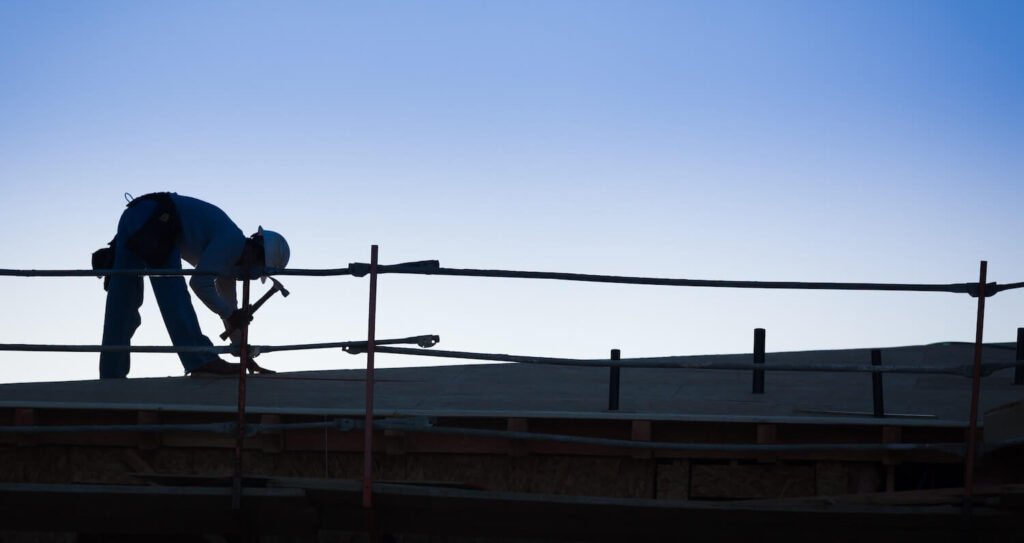Your roof. It’s the unsung hero of your home, a steadfast shield against the elements, protecting you and your loved ones from rain, sun, wind, and even the occasional hailstorm. But like any hardworking component of your property, it will inevitably require attention and repair. The thought of roof repairs can often conjure images of hefty bills and unexpected financial burdens. However, navigating these necessary fixes doesn’t have to break the bank. With careful planning, smart choices, and a focus on value rather than just the lowest price, you can effectively manage roof repairs on a budget without compromising the long-term integrity and quality of your home’s defense.
This article will delve into practical strategies and insightful tips to help you save money on Let’s explore practical strategies and tips to help you save money on roof repairs while ensuring the work is done right, protecting your roof and wallet. while ensuring the work is done right. We’ll explore everything from proactive maintenance to savvy contractor selection, empowering you to make informed decisions that protect both your home and your wallet.
The Importance of Timely Repairs: A Penny Saved is a Pound Earned
Before diving into cost-saving measures, it’s crucial to understand why delaying roof repairs in an attempt to save money can be a costly mistake in the long run. Ignoring minor issues can lead to significant and expensive problems down the line. A small leak, for instance, might seem insignificant initially, but over time, it can cause:
- Structural Damage: Water infiltration can weaken roof decking, rafters, and even load-bearing walls, leading to costly structural repairs.
- Mold and Mildew Growth: Damp environments created by leaks are breeding grounds for mold and mildew, which can harm your health and require professional remediation.
- Insulation Damage: Wet insulation loses its R-value, leading to increased energy bills as your heating and cooling systems work harder.
- Interior Damage: Water stains on ceilings and walls are unsightly and can damage paint, drywall, and belongings.
Therefore, addressing roof issues promptly, even if it means incurring an initial cost, is a fundamental aspect of saving money in the long run. Think of it as preventative medicine for your home – addressing small ailments before they turn into major illnesses.
Proactive Maintenance: Your First Line of Defense Against Costly Repairs
The most effective way to save money on roof repairs is to prevent them in the first place. Regular roof maintenance can identify potential problems early, allowing for minor fixes before they escalate into major, expensive undertakings. Here’s how you can be proactive:
- Regular Visual Inspections: At least twice a year (spring and fall) and after severe weather events, take a careful look at your roof from the ground. Use binoculars for a closer inspection. Look for cracked, curled, or missing shingles, loose flashing around vents and chimneys, sagging areas, and any accumulation of debris.
- Clean Gutters and Downspouts: Clogged gutters can cause water to back up onto the roof, leading to leaks and water damage. Ensure your gutters and downspouts are clear of leaves, twigs, and other debris.
- Trim Overhanging Trees: Branches that rub against your roof can damage shingles and create pathways for pests. Trim any overhanging trees regularly.
- Monitor Your Attic: Check your attic for signs of leaks, such as water stains, dampness, or mold growth. Good ventilation in the attic can also help prevent moisture buildup.
By investing a little time and effort in regular maintenance, you can significantly reduce the likelihood of facing major roof repairs.
Smart Strategies for Budget-Friendly Roof Repairs
When repairs are necessary, there are several smart strategies you can employ to manage costs effectively without sacrificing quality:
1. Obtain Multiple Quotes: Knowledge is Power
Never settle for the first quote you receive. Contact at least three reputable roofing contractors in your area to get detailed estimates for the repair work. This allows you to compare pricing, understand the scope of work proposed by different contractors, and identify any significant discrepancies. Be sure that each contractor is bidding on the same scope of work to ensure an apples-to-apples comparison.
2. Understand the Scope of Work: What Are You Paying For?
Don’t just focus on the bottom-line price. Carefully review each quote to understand exactly what is included. Ask questions about the materials being used, the labor involved, the estimated timeline, and any warranties offered. A lower price might be tempting, but it could come with lower-quality materials or incomplete work, leading to more expenses down the road.
3. Material Choices: Balancing Cost and Quality
The type of roofing material plays a significant role in the overall cost of repairs. While sticking with your existing material is often the most straightforward approach, it’s worth discussing alternatives with your contractors, especially if a significant portion of your roof needs repair. Consider factors like:
- Durability: How long is the material expected to last? A slightly more expensive material with a longer lifespan might be more cost-effective in the long run.
- Energy Efficiency: Some roofing materials can help reflect sunlight and reduce cooling costs.
- Aesthetics: While budget is a primary concern, consider how the chosen material will affect the overall look of your home.
Your contractor can provide valuable insights into the pros and cons of different materials based on your local climate and your specific needs.
4. Timing Your Repairs: Seasonal Considerations
The time of year can sometimes influence the cost of roof repairs. Demand for roofing services tends to be higher during peak seasons (like spring and summer in many regions), which can potentially lead to higher prices. If your repairs aren’t urgent, you might consider scheduling them during the off-season when contractors may have more availability and potentially offer more competitive pricing. However, don’t delay critical repairs just to save a few dollars, as this could lead to further damage.
5. DIY vs. Professional: Knowing Your Limits
For very minor repairs, such as replacing a few damaged shingles, you might be tempted to tackle the job yourself. While DIY can save on labor costs, it’s crucial to honestly assess your skills and experience. Roofing work can be dangerous, and improper repairs can lead to further damage and void any existing warranties. For anything beyond very basic fixes, it’s generally best to hire a qualified professional.
6. Negotiate and Inquire About Discounts: It Doesn’t Hurt to Ask
Once you’ve received multiple quotes, don’t be afraid to negotiate. You might be able to work out a slightly better price, especially if you’re willing to be flexible with the scheduling. Inquire about any potential discounts, such as those for seniors, veterans, or bundled services if you have other home improvement projects planned.
7. Warranty and Insurance: Understanding Your Coverage
Before any work begins, ensure you understand the warranties offered by both the roofing material manufacturer and the contractor. A good warranty can provide peace of mind and protect you against defects in materials or workmanship. Additionally, review your homeowner’s insurance policy to see if any of the roof damage is covered. While insurance typically doesn’t cover wear and tear or lack of maintenance, it may cover damage caused by sudden and accidental events like storms or fallen trees.
8. Payment Options: Avoiding High-Interest Financing
Discuss payment options with your chosen contractor. Avoid high-interest financing offers that could significantly increase the overall cost of your repairs. If possible, pay for the repairs outright or explore low-interest financing options through your own bank or credit union.
9. Focus on Quality Over the Lowest Price: A Long-Term Investment
While staying within your budget is essential, remember that the cheapest option isn’t always the best. Cutting corners on materials or hiring an unqualified contractor can lead to subpar work that will likely result in more costly repairs down the line. Focus on finding a balance between affordability and quality to ensure a durable and long-lasting repair.
10. Phased Repairs: Addressing Urgent Issues First
If your roof requires multiple repairs and your budget is tight, discuss the possibility of phased repairs with your contractor. This involves addressing the most urgent issues first, such as active leaks or structural damage, and tackling less critical repairs over time as your budget allows. This approach can help prevent further damage while spreading out the cost.
Finding the Right Contractor: A Crucial Step
Selecting the right roofing contractor is paramount to ensuring quality work and a positive experience. Here are some tips for finding a reputable and reliable contractor:
- Check for Licensing and Insurance: Ensure the contractor is properly licensed and insured (both general liability and workers’ compensation) in your state and locality. This protects you in case of accidents or damage during the repair process.
- Read Online Reviews and Testimonials: Look for contractors with positive reviews and a strong reputation. Check websites like the Better Business Bureau (BBB), Angie’s List (now Angi), and Google Reviews.
- Ask for References: Request a list of recent customers you can contact to inquire about their experience with the contractor.
- Verify Their Physical Address: A legitimate roofing company will have a physical business address. Be wary of contractors who only provide a P.O. box or work solely from a mobile phone.
- Get a Detailed Written Contract: The contract should clearly outline the scope of work, materials to be used, total cost, payment schedule, estimated start and completion dates, and warranty information. Don’t sign anything you don’t fully understand.
Long-Term Savings: Beyond the Immediate Repair
Remember that saving money on roof repairs isn’t just about the immediate cost. By investing in quality materials and workmanship, and by implementing proactive maintenance, you are investing in the long-term health and value of your home. A well-maintained roof can:
- Increase Home Value: A sound roof is a significant selling point for potential buyers.
- Improve Energy Efficiency: Proper insulation and ventilation, often addressed during roof repairs, can lower your energy bills.
- Prevent Future Headaches: Addressing issues promptly and thoroughly can save you from the stress and expense of more significant problems down the road.
Conclusion: A Roof Over Your Head Without Breaking the Bank
Roof repairs are an inevitable part of homeownership, but they don’t have to be a source of financial anxiety. By embracing proactive maintenance, employing smart strategies when repairs are needed, and carefully selecting a qualified contractor like Copeland’s Complete Construction, you can effectively manage your roof repair budget without sacrificing the quality and integrity of this vital component of your home. Remember that a penny saved through prevention and wise choices is truly a pound earned in long-term security and peace of mind. Your roof protects you; by being a savvy homeowner, you can protect your wallet, too.

